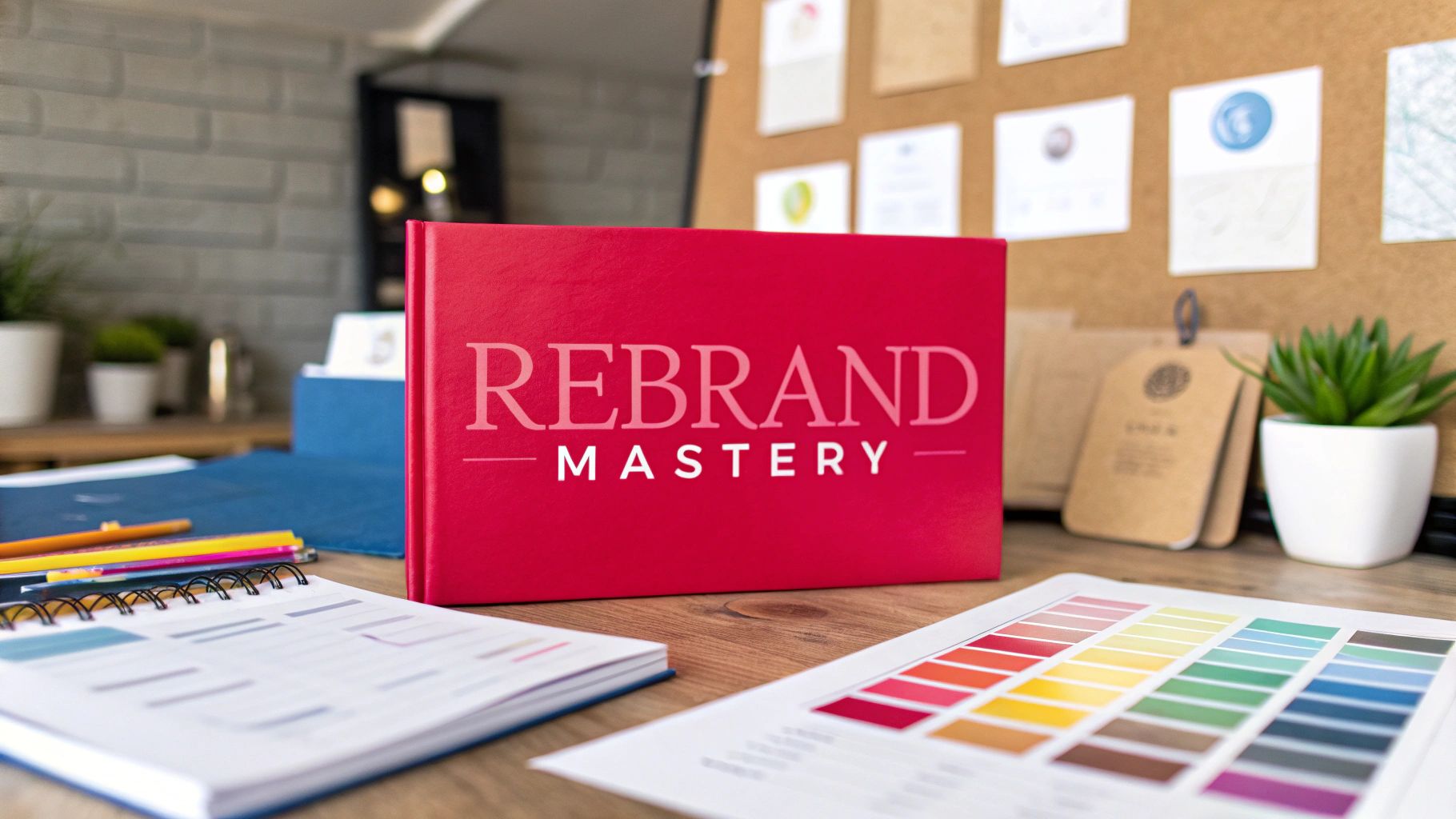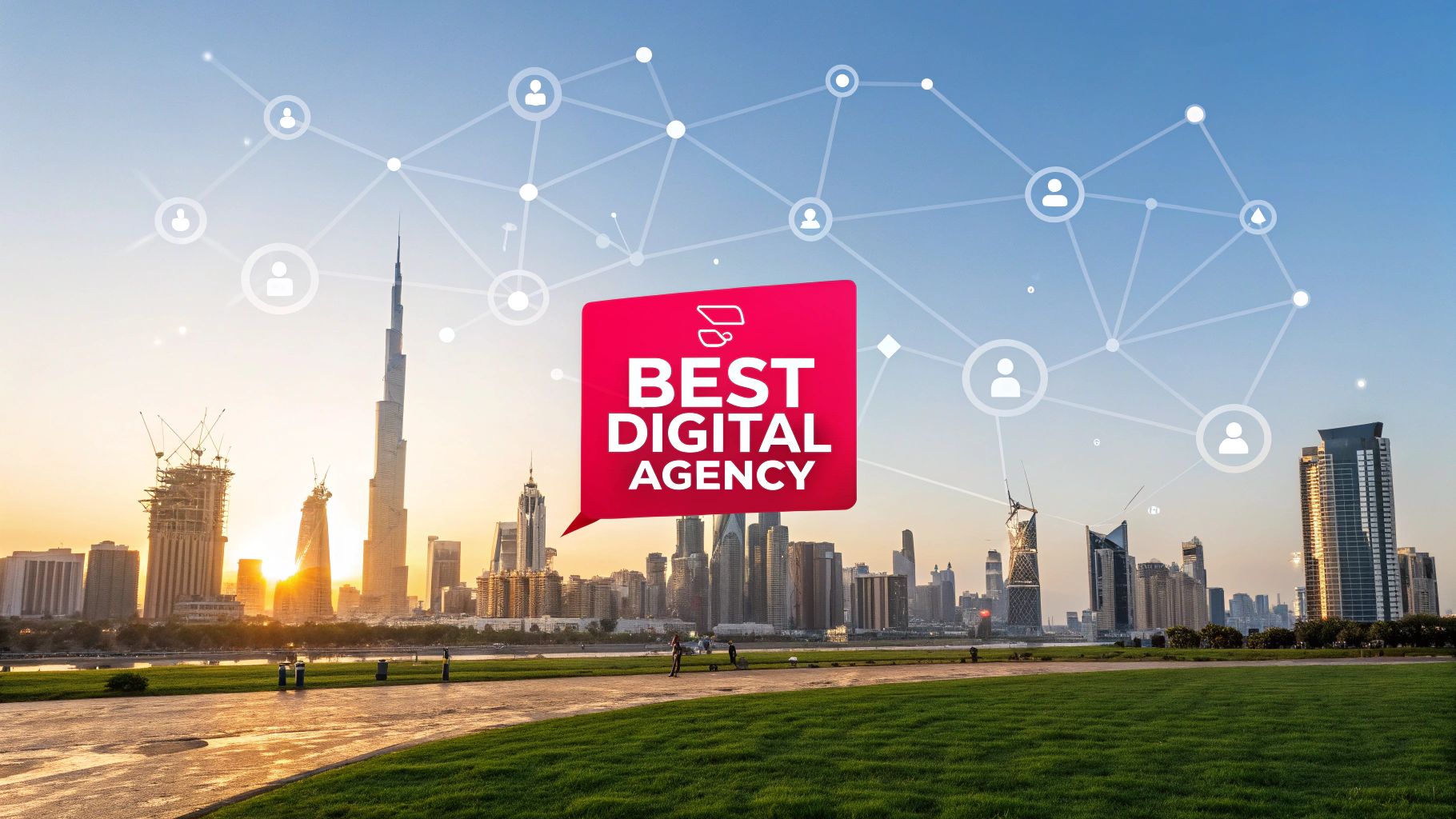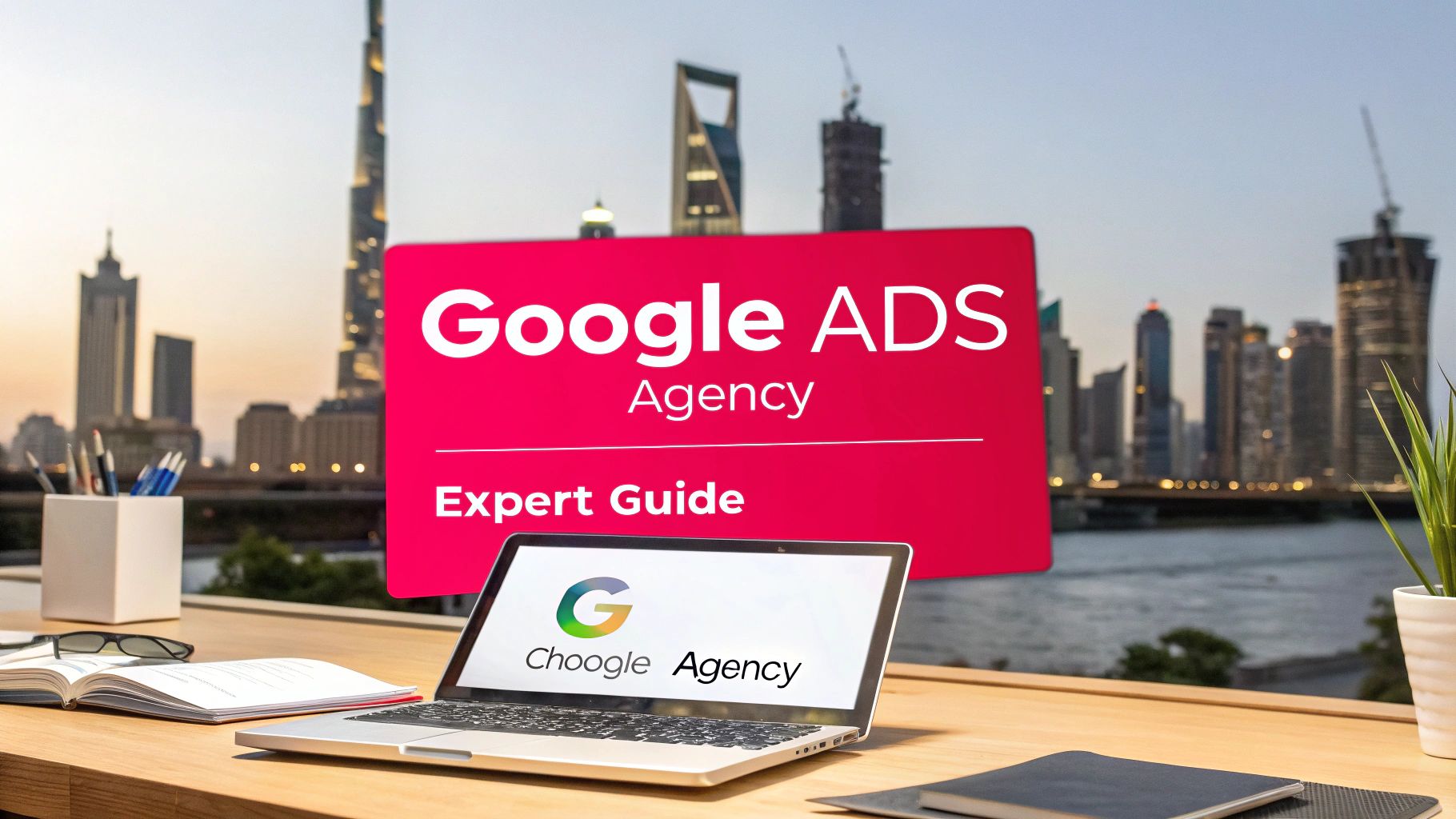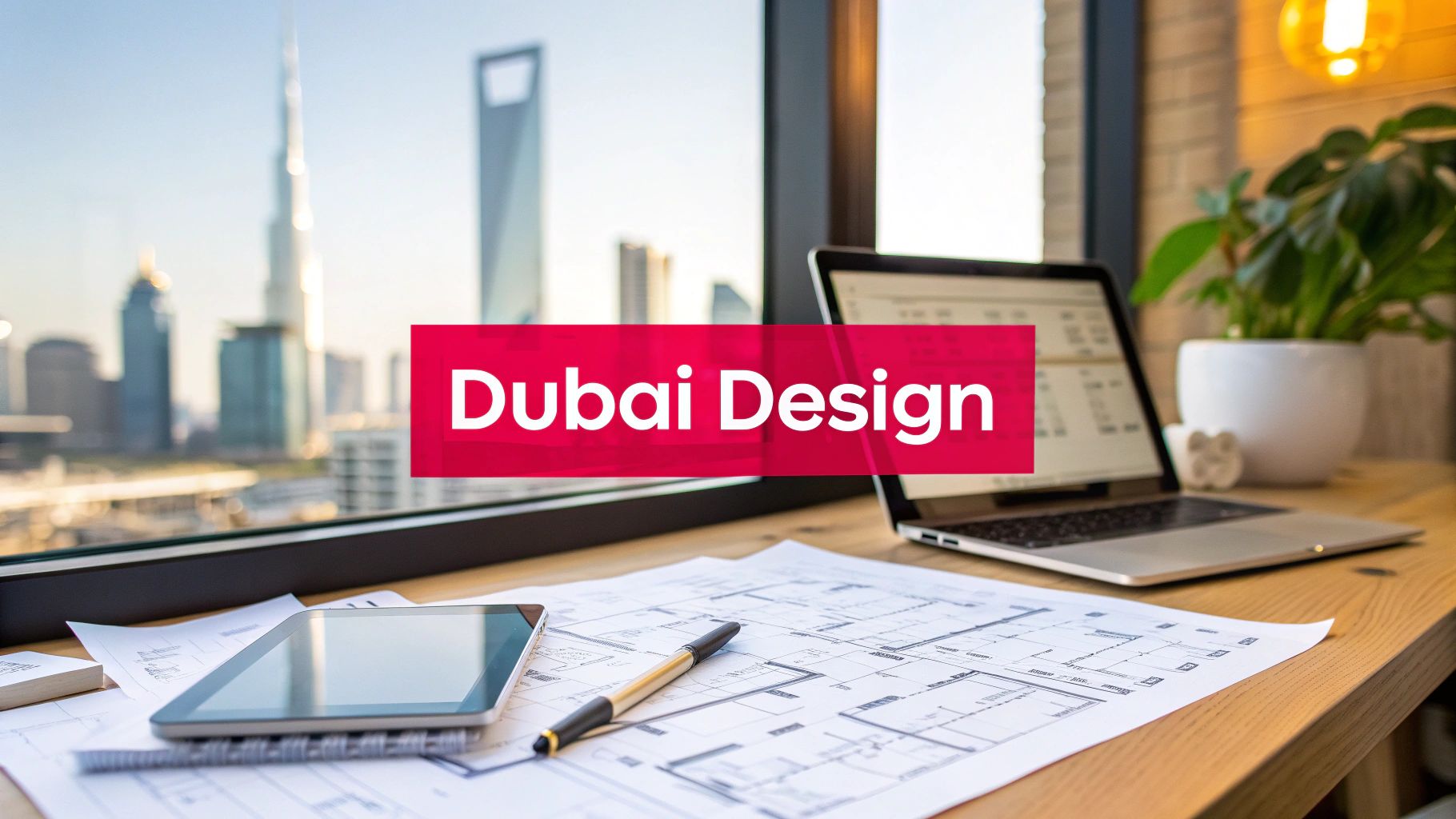Building a successful e-commerce website in Dubai isn't just about putting products online. It's about tapping into a market that's not just growing, but accelerating at an incredible pace. The opportunity here is huge, thanks to a unique mix of sky-high internet usage, supportive government initiatives, and a population that lives and breathes digital.
This combination makes Dubai a fantastic launchpad for anyone looking to build a serious online retail business.
Tapping into Dubai's Booming E-commerce Market
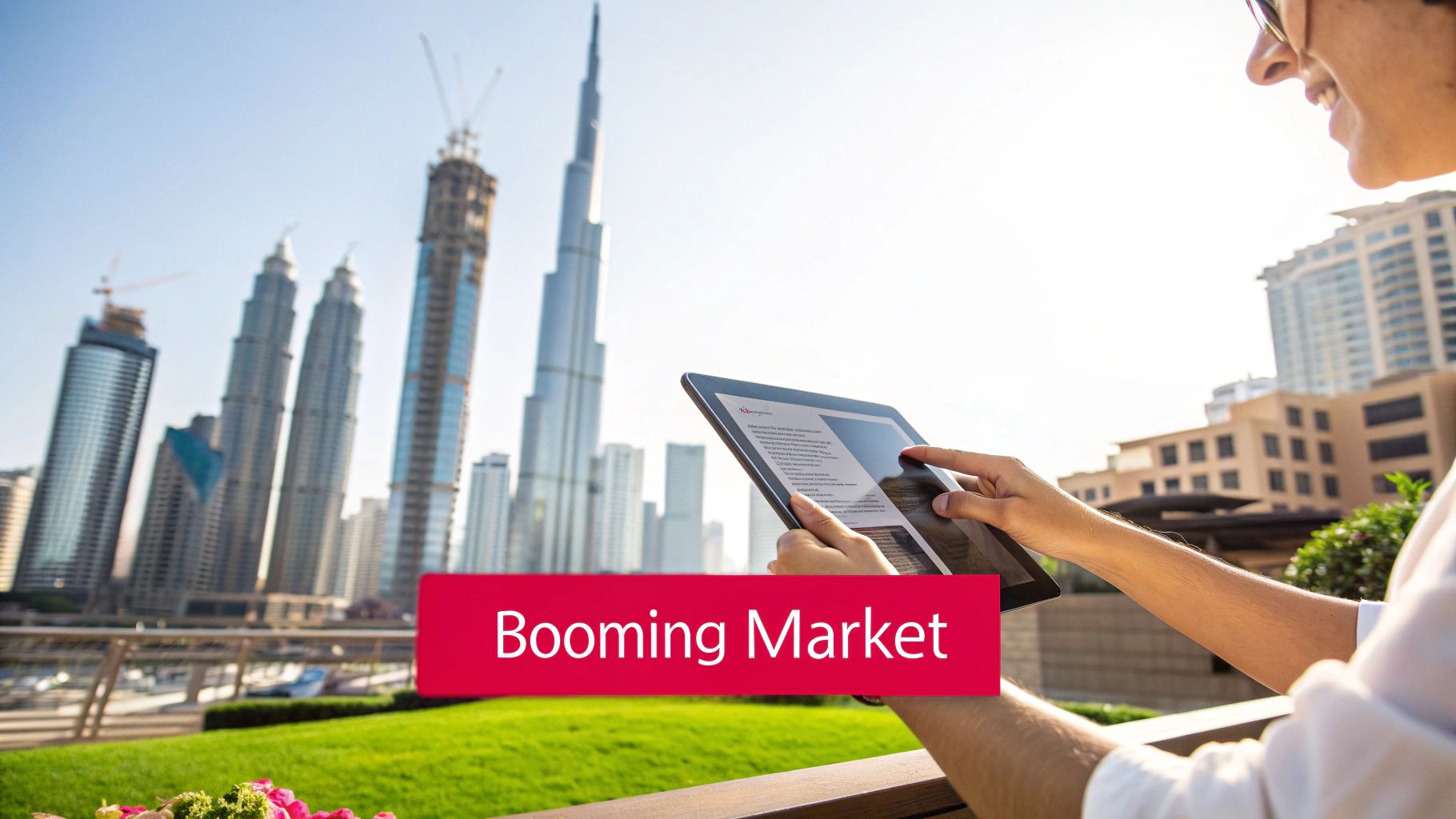
Dubai’s digital marketplace is one of the most energetic in the world, and that’s no accident. This growth is fuelled by a few key factors that have created the perfect environment for online retail to flourish. If you're thinking about jumping in, getting a handle on these drivers is your first real step towards finding a profitable spot.
The sheer connectivity here is a massive catalyst. The UAE’s e-commerce market rocketed to around AED 27 billion by the end of 2022, growing at a rate of over 20% year-on-year since 2020. What's powering this? A population where over 99% of households have internet and 96% own a smartphone. This isn't just a market; it's a hyper-connected ecosystem.
This deep digital adoption has created a base of tech-savvy customers with very high standards. They don’t just want to shop online; they expect the experience to be smooth, easy, and, above all, fast.
Dubai E-commerce Market at a Glance
To put it in perspective, here are some of the core numbers and factors that define the e-commerce scene in Dubai and the wider UAE.
| Metric | Statistic |
|---|---|
| Market Value (2022) | Approximately AED 27 billion |
| Annual Growth Rate | Over 20% since 2020 |
| Internet Penetration | 99% of households |
| Smartphone Ownership | 96% of the population |
| Key Consumer Driver | High demand for speed and convenience |
| Logistics Expectation | Same-day or next-day delivery is standard |
These figures paint a clear picture: this is a mature, demanding, and incredibly lucrative market for those who can meet its expectations.
Understanding Dubai's Unique Consumer Behaviour
To really succeed, you have to look past the impressive stats and get inside the local mindset. Shoppers in Dubai have specific preferences that heavily shape what they buy and where they buy it from.
For example, mobile shopping isn't just a feature—it's everything. It’s the main way people browse, research, and purchase. An online store that isn't perfectly optimised for mobile is practically invisible here.
A crucial takeaway for any aspiring e-commerce entrepreneur in Dubai is this: your customer's journey likely begins and ends on a smartphone. A clunky mobile interface or a slow-loading site is a direct path to a lost sale.
On top of that, delivery speed is a huge deal. Same-day or next-day delivery isn't a premium service anymore; it's the baseline expectation. This has pushed the logistics infrastructure to be incredibly efficient, making rapid fulfilment a non-negotiable part of your business model.
Dominant Product Categories and Market Dynamics
While you can sell almost anything online, a few product categories consistently lead the pack. These give you a great snapshot of what local consumers are spending their money on:
- Electronics and Gadgets: The appetite for the latest tech is insatiable.
- Fashion and Beauty: This is a massive market, with strong demand for both luxury and high-street brands.
- Groceries and Food Delivery: Convenience is king, and the online grocery sector has seen explosive growth.
It’s also worth noting that cross-border shopping is common. Customers in Dubai have no problem buying from international websites, which means local businesses are competing on a global stage right from day one. This makes it essential to have a polished, professional online presence that builds trust from the very first click. For more detailed strategies on this, you can check out our comprehensive guide on e-commerce in Dubai.
The competitive landscape is definitely a challenge, but for those who get it right, the rewards are more than worth it.
Navigating Dubai's E-commerce Licensing Rules
Before you even think about website design or marketing, you need to get your legal house in order. In Dubai, this isn't a step you can skip and come back to later. Unlike many other places, you must have the correct legal structure in place before you process a single dirham. It’s a foundational step that legitimises your business, builds crucial customer trust, and keeps you clear of serious penalties.
The right licence sets the stage for everything that follows—your operational scope, ownership structure, and how much you can realistically grow.
E-Trader Licence for Small-Scale Operations
If you're just starting out, maybe running a small business from home, the E-Trader licence is likely your best bet. This licence, issued by the Department of Economy and Tourism (DET), is tailor-made for individuals operating through social media or a basic website. It’s a very accessible way to get your online hustle legal without the expense of a physical office.
The main draw is its simplicity. It lets UAE and GCC nationals, plus certain expatriates, sell products right from their homes. But it’s important to know its limits. With an E-Trader licence, you generally can't hire staff or open a physical storefront. Think of it as the perfect launchpad for solo entrepreneurs wanting to test the waters.
This infographic breaks down the key differences between the E-Trader Licence and a full Commercial Licence.
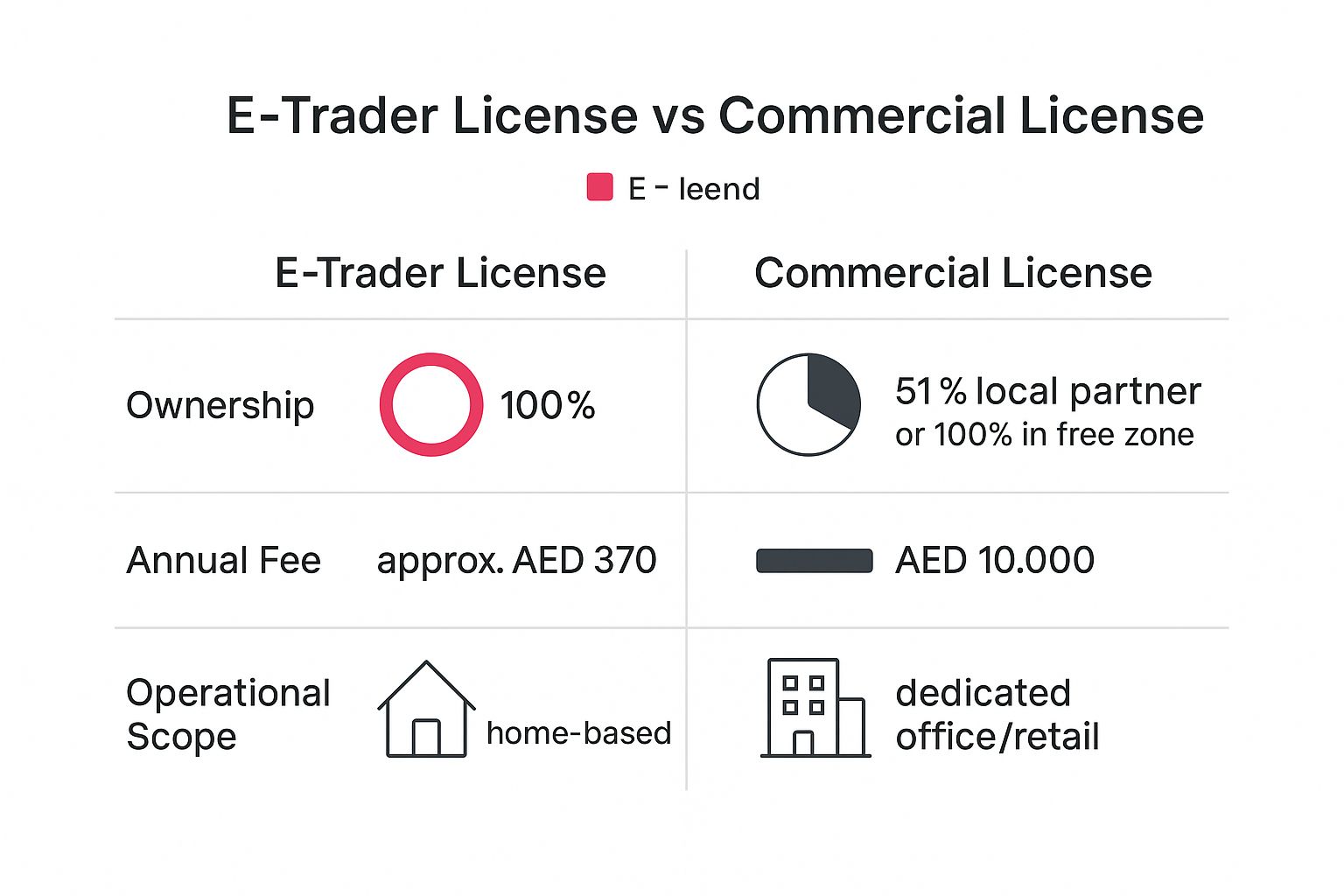
Ultimately, you're trading operational freedom for affordability. The E-Trader licence gets you started quickly and cheaply, while a Commercial Licence is what you'll need when you're ready to scale.
Mainland vs. Free Zone: Choosing Your Location
As your business matures, you'll hit a fork in the road: set up on the Dubai mainland or in a free zone? This decision has huge implications for your ownership, taxes, and customer reach.
A mainland licence gives you unrestricted access to the entire UAE market. If your customers are spread across the Emirates, this is a massive plus. The old rule of thumb was that you needed a local Emirati partner holding 51% of the company, but recent reforms have thankfully relaxed this requirement for many activities. Still, it’s something to be aware of.
Free zones, on the other hand, offer 100% foreign ownership, no personal or corporate income tax, and the ability to send all your profits home. Purpose-built hubs like Dubai CommerCity are fantastic for e-commerce, providing world-class logistics and a supportive ecosystem right out of the box.
The choice really boils down to your target market. If you're selling directly to consumers across the UAE, a mainland licence is often more direct. If you're focused on international sales or simply want full control and ownership, a free zone is the clear winner.
One thing to remember with a free zone is that you'll usually need a local distributor to sell products on the mainland. It's an extra logistical step, but for many, the benefits of a free zone far outweigh this.
Essential Rules for Consumer Protection
Getting your licence is just the beginning; staying compliant is an ongoing job. Your website has to follow Dubai’s consumer protection and data privacy laws to the letter. This isn't just about ticking boxes—it's about building a trustworthy brand.
Here are the non-negotiables your website must have:
- Clear Policies: Your terms and conditions, privacy policy, and return policy need to be easy to find and written in simple, plain English. No jargon.
- Accurate Product Information: Everything you state about your products—from descriptions and specs to prices—must be completely accurate. No surprises for the customer.
- Secure Payment Processing: It's on you to make sure every transaction is secure and that customer payment details are protected with robust security.
Beyond that, the UAE Personal Data Protection Law dictates how you handle customer data. You have to be transparent about what you collect and get clear consent. Ignoring these rules can lead to eye-watering fines and, worse, destroy the reputation you've worked so hard to build.
Choosing the Right Tech Stack for the UAE
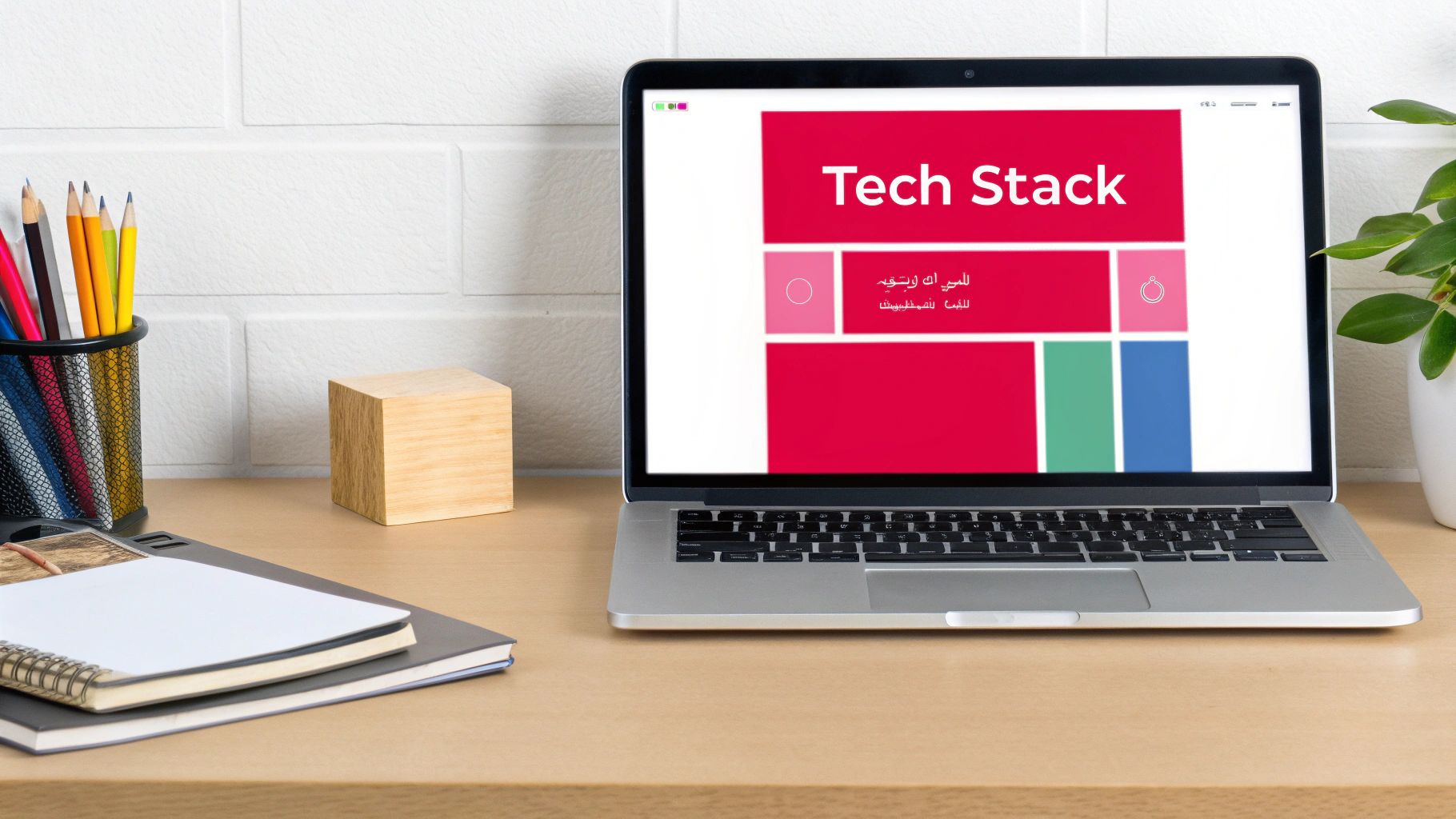
The technology that powers your e-commerce website is its engine. Get it right, and you’ll have the speed and power to grow. Get it wrong, and you'll face constant friction. This decision is much more than just picking a nice-looking template; it’s about choosing a system that genuinely understands and adapts to the nuances of the UAE market.
Think of your tech stack as a cohesive ecosystem, not just a random collection of tools. It needs to handle everything from displaying Arabic text in a right-to-left layout to seamlessly processing payments through local gateways. Making smart choices here is one of the most critical investments you can make in your online business.
Comparing the Top E-commerce Platforms
When it comes to building an online store in Dubai, three names pop up again and again: Shopify, WooCommerce, and Magento (now Adobe Commerce). Each has its own strengths and is built for different business scales and technical comfort levels. Let's break them down.
Shopify is famously user-friendly, which makes it a fantastic starting point for new businesses. It’s an all-in-one, hosted platform, meaning you don't have to get your hands dirty with server maintenance, security, or updates. This lets you focus purely on selling.
WooCommerce, on the other hand, is a plugin for WordPress that offers incredible flexibility. If you already run a WordPress site or crave complete creative control over every pixel, this is a powerful option. But with great power comes great responsibility—you'll be in charge of managing your own hosting and security.
Choosing a platform is like choosing a business partner. Shopify is the partner who handles all the operational details for a fee, while WooCommerce is the flexible partner who gives you the freedom to build anything, provided you manage the process yourself.
Then there's Magento. This is the enterprise-level powerhouse, built for large-scale operations with complex inventories and specific needs. It offers unmatched power and customisation but comes with a steeper learning curve and a bigger budget to manage it effectively. It's the go-to for established brands that need a highly specialised and robust setup.
Essential Platform Features for the Dubai Market
Just picking a platform isn't enough. To truly succeed in the UAE, your website must meet local expectations head-on. Here are the absolute non-negotiables your chosen platform must support:
- Arabic Language and RTL Support: Your site has to flawlessly display Arabic text, which reads from right to left (RTL). This isn’t just about the content; the entire layout, from menus to buttons, needs to flip to create a natural browsing experience.
- Local Payment Gateway Integration: The ability to easily connect with regional payment processors like Telr or PayFort (now Amazon Payment Services) is critical. It builds trust and makes buying from you a breeze for local customers.
- Multi-Currency Display: While the UAE Dirham (AED) will be your primary currency, showing prices in other major currencies like USD can be a great touch, especially if you're aiming to attract international shoppers or tourists.
To help you decide, here’s a quick look at how the top platforms compare for a Dubai-based business.
Popular E-commerce Platforms for the Dubai Market
This table provides a snapshot comparison of the leading platforms, highlighting their strengths within the specific context of the UAE market.
| Platform | Best For | Key Features (Dubai Context) | Pricing Model |
|---|---|---|---|
| Shopify | Start-ups & SMBs | User-friendly, good app ecosystem for local integrations, strong security. | Monthly Subscription |
| WooCommerce | Businesses wanting control | Highly customisable, excellent for content-heavy sites, full RTL support. | Free (Hosting & extensions cost) |
| Magento | Large-scale enterprises | Extremely powerful, scalable, handles complex catalogues and multi-store setups. | Open Source (Free) / Adobe Commerce (Paid) |
Choosing the right fit from this list depends entirely on your budget, technical resources, and long-term business goals.
The Case for Local Hosting
You might not think it matters, but where your website is physically hosted can make a huge difference. While big international hosting providers are tempting, choosing a local server in the UAE gives you a significant performance boost. Being physically closer to your customers reduces latency, which is just a technical way of saying your website will load much faster for visitors in the region.
A faster site doesn't just improve the user experience; it also gives your SEO a nice little push. Search engines favour sites that load quickly. It's a simple change that can give you a real competitive edge.
Ultimately, a well-built website is an ongoing project. For businesses seeking a partner to navigate these technical decisions, a deep dive into expert e-commerce website development in Dubai can offer clarity and a strategic advantage right from the start. Properly integrating tools for inventory and customer relationship management (CRM) will turn your site from a simple shop into a powerful, data-driven sales machine.
Mastering Local Payments and Logistics
Once your digital storefront is up and running, your real-world success boils down to two things: getting paid and getting products to customers. For anyone building an e-commerce website in Dubai, these aren't just details to figure out later. They are the absolute core of customer satisfaction and, frankly, whether your business survives.
Shoppers in Dubai have high expectations. They want a smooth, trustworthy experience from the moment they click ‘buy’ to the second a package lands on their doorstep. This means offering payment methods they know and trust, backed by the kind of rapid, reliable delivery that's become the norm here. Get either of these wrong, and you can sink your brand's reputation before it even has a chance to float.
Navigating Dubai’s Payment Gateway Landscape
To accept online payments, you'll need a payment gateway that’s secure, reliable, and plays nicely with your e-commerce platform. While you could go with a big international name, the local gateways are often better tuned to regional preferences and instil a sense of trust right away.
The two names you’ll see pop up constantly are Telr and PayFort, which has since been rebranded as Amazon Payment Services. Both are solid choices, but they serve slightly different business needs.
- Telr: This one is known for its relatively simple setup and great support for start-ups. It’s a flexible option that can easily scale as your business grows.
- Amazon Payment Services (formerly PayFort): With the muscle of Amazon behind it, this gateway brings top-notch security and a suite of advanced features, making it a go-to for larger, more established e-commerce players.
When you're weighing them up, look closely at their transaction fees, any setup costs, and the integration process for your specific platform. A clunky checkout is the fastest way to lose a sale, so this decision is a big one.
The Unshakeable Importance of Cash on Delivery
Even with the rise of digital wallets, Cash on Delivery (COD) is still king in the UAE. For a huge number of shoppers, it's about comfort and trust—they want to physically see the product before they part with their cash.
For a new e-commerce site in Dubai, choosing not to offer COD is a massive mistake. Yes, it comes with logistical headaches, but you risk cutting off a huge slice of your potential market and watching your conversion rates plummet.
Now, COD isn't without its own set of problems. The biggest headaches are the higher return rates and the dreaded "customer refused delivery" scenario, which leaves you footing the bill for a round-trip delivery. You can get ahead of this with a few smart tactics:
- Give every COD customer a quick confirmation call or WhatsApp message before you ship.
- For big-ticket items, consider asking for a small, non-refundable deposit.
- Make your returns policy crystal clear on your website to manage expectations right from the start.
Perfecting Your Logistics and Fulfilment Strategy
In Dubai, speed is the name of the game. Same-day or next-day delivery isn't a premium service; it's the baseline expectation. Your delivery partner is effectively the final handshake with your customer, so choosing the right one is absolutely critical.
Companies like Aramex and Fetchr have built their networks specifically for the fast-paced demands of local e-commerce. Aramex is a regional powerhouse with a long-standing reputation for being dependable. Fetchr carved out its niche with a cool, app-based model that uses a customer's phone GPS for pinpoint delivery—a lifesaver in a city where street addresses can be tricky.
To really get this right, you need a solid grasp of what e-commerce fulfillment entails. This goes beyond just shipping; it's about how you manage inventory, process orders, and handle returns. A smooth, no-questions-asked returns process, for instance, is one of the best ways to build loyalty. Make it easy for people, and they'll come back.
Getting Your Dubai Store Noticed
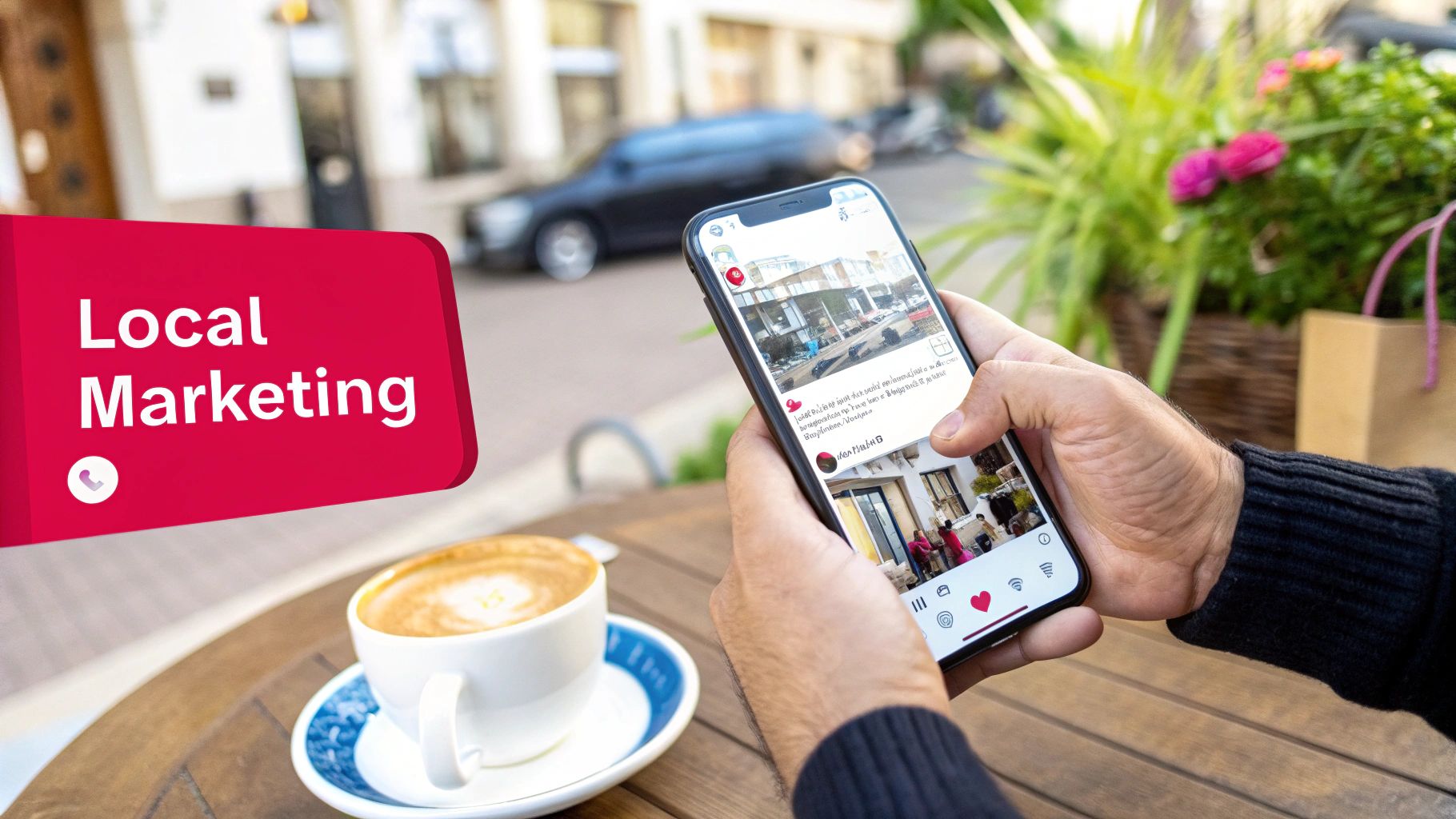
Let's be honest. You can have the most beautiful, user-friendly e-commerce site in the world, but if nobody sees it, it’s just a digital ghost town. To make any real impact in Dubai, you need a marketing plan that speaks directly to the city’s unique, tech-savvy audience.
This isn’t a market where you can just copy and paste a generic ad strategy. The competition is intense. Success here means cutting through the noise with a multi-channel approach that genuinely connects with local culture, social media habits, and search behaviours.
Meet Your Customers on Social Media
In the UAE, social media is more than just a place to connect; it’s where commerce happens. We’re looking at a user base projected to hit nearly 9.83 million by 2025. Platforms like Instagram and TikTok aren't just channels—they are the modern-day souk.
People in Dubai scroll through these visual-first platforms looking for inspiration. They respond to high-quality, aspirational content that feels authentic. So, think less about hard selling and more about building a lifestyle around your brand. A fashion store, for instance, could create punchy TikToks showing an outfit styled for iconic Dubai moments, from a desert safari to brunch at the Marina.
A mistake I see all too often is new e-commerce brands underestimating video. Static images have their place, but it's the dynamic, engaging Reels and TikToks that stop the scroll and create an instant connection.
Getting your ad campaigns right on these platforms takes a bit of local know-how. You can get really smart with your targeting by using AI to launch ads to optimise your messaging. If you want a deeper dive into what works here, our guide on social media marketing in the UAE is a great place to start.
Master the Art of Bilingual SEO
When it comes to Search Engine Optimisation (SEO) in Dubai, there’s a crucial detail many overlook: language. English is dominant, yes, but a massive part of your potential market is searching in Arabic. If you ignore Arabic SEO, you're leaving a lot of money on the table.
A smart SEO strategy here has to be bilingual. And no, that doesn't just mean running your keywords through a translator. It’s about understanding the distinct search habits and phrases used in both languages.
Here’s a practical approach:
- Two Sets of Keywords: Do your keyword research twice—once for English, once for Arabic. Dig into local dialects and slang to find the real gems.
- Signal to Google: Use
hreflangtags on your site. This tells search engines you have different language versions of the same page, avoiding duplicate content penalties and showing the right page to the right user. - Culturally Smart Content: Don’t just translate your blog posts or product descriptions. Create content that resonates with the cultural nuances of both English and Arabic-speaking audiences to build genuine trust.
Tap into Local Shopping Seasons
Dubai's retail calendar is packed with major cultural and shopping events. These are golden opportunities to drive sales, and aligning your marketing with them is non-negotiable.
Plan major campaigns around these key dates:
- Ramadan and Eid: A time for family, reflection, and generosity. Your marketing should be respectful, focusing on community and gifting. It's a huge period for fashion, gifts, and food.
- Dubai Shopping Festival (DSF): This city-wide extravaganza is all about deals. It's the time to run your most aggressive sales and special offers to capture the attention of bargain hunters.
- White Friday: As the region’s answer to Black Friday, shoppers have been trained to expect massive discounts. Make sure you're ready to compete.
By building your marketing calendar around these events, you plug into the existing buzz and buying intent. More importantly, it shows that your brand is in tune with the local culture, which is essential for building a loyal customer base that sticks with you long after the sale is over.
Got Questions? We've Got Answers
Stepping into the world of e-commerce in Dubai can feel like you have a million questions. It's a common feeling, especially for entrepreneurs who are new to the scene. I've pulled together some of the most frequent questions I hear to give you some clear, straightforward answers.
Do I Really Need a Special Licence to Sell Online in Dubai?
Yes, absolutely. This is non-negotiable. If you're an individual just testing the waters or running a small business from home, the E-Trader licence is your best bet. It was created specifically for small-scale operations, like those selling through social media.
But the moment you decide to hold inventory, bring on team members, or work from a commercial space, you've graduated to needing a full e-commerce licence. You can get this from a mainland authority or one of the many free zones. Don't even think about skipping this step—operating without the right licence comes with heavy fines, so make it your top priority.
The rule is simple: if you're selling online in Dubai, you need a licence. Whether you start with an E-Trader or go for a full commercial licence really boils down to how big you plan to go.
What Payment Methods Are a Must-Have for a Dubai Store?
If you want to capture every possible sale, you need to make paying easy and familiar for everyone. Dubai's shoppers have diverse preferences, and not offering their favourite method is a surefire way to see them abandon their cart.
Here are the essentials:
- Credit and Debit Cards: This is the baseline expectation. You’ll need to integrate with a solid local payment gateway like Telr or Amazon Payment Services.
- Digital Wallets: Convenience is king. Apple Pay and Google Pay are soaring in popularity, offering a seamless checkout for your mobile customers.
- Cash on Delivery (COD): This one is crucial. A huge portion of the market here still prefers to pay with cash upon receiving their order. For many, it's about seeing the product in person before handing over money.
Ignoring COD, especially when you're a new brand trying to build trust, could seriously damage your conversion rates. It's a bit more work logistically, but it's a commercial necessity in this region.
How Important Is It to Have My Website in Arabic?
While you can certainly get by with an English-only site, adding an Arabic version is a game-changer. It’s more than just translation; it’s a sign of respect for local culture and a message that you’re committed to serving the entire community.
An Arabic site instantly makes your brand accessible to Emirati nationals and other Arabic-speaking residents who feel more comfortable shopping in their first language. And don't forget about marketing—it's essential for Arabic SEO, letting you tap into a whole new audience on search engines.
If a fully bilingual site seems like too much for your launch, a good compromise is offering customer support in both English and Arabic. It shows you're making an effort.
What Are the Biggest Hurdles for E-commerce Businesses in Dubai?
Every market has its quirks, and Dubai is no exception. Knowing the potential roadblocks from the outset helps you build a much stronger, more resilient business.
From my experience, the main challenges fall into three buckets:
- The Initial Setup: Getting your head around the licensing and legal paperwork can feel a bit daunting. It’s a process that demands patience and attention to detail.
- Logistics and Delivery: People here expect things fast. Really fast. Setting up a reliable, speedy, and affordable fulfilment system is one of the biggest operational puzzles you'll have to solve.
- A Crowded Marketplace: The competition is fierce. To make your mark, you need a killer brand, something that truly makes you different, and a very smart digital marketing plan.
On top of that, you have to be ready for the realities of Cash on Delivery, which often means dealing with higher return rates and customers who refuse a delivery. Solid planning and clear communication are your best tools to manage this.
At Grassroots Creative Agency, we help brands navigate the complexities of the Dubai market every day. From building powerful e-commerce websites to creating marketing that truly connects with local buyers, we have the on-the-ground expertise to help you succeed. Find out how we can help your brand take off at https://grassrootscreativeagency.com.


